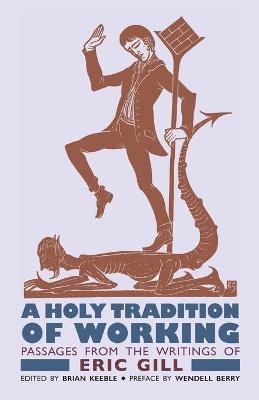A Holy Tradition of Working: Passages From the Writings of Eric Gill

A Holy Tradition of Working: Passages From the Writings of Eric Gill
Eric Gill (1882-1940) is well known as a sculptor, wood and stone carver, letter, engraver, typeface designer, and graphic artist. But he was also a radical religious and social philosopher-a Christian revolutionary-for whom "life was more than art," because it was the highest art, the art of being human. Thus his interests were never theoretical and his view of life was holistic, involving the whole person in a unity of art, work and spiritual values.
A convert to Catholicism in 1913, Gill brought to the movement of social and aesthetic renewal founded by Ruskin and William Morris a sensibility sharpened both by Non-conformism and by the enthusiastic acceptance of Thomism. After World War I, Gill helped create the Ditching Guild, and independent society of Roman Catholics bound together by common faith and common ideas about work and human society. In 1924, Gill moved with his family and a few friends, now under the rule of third-order Dominicans, to Capel-y-ffin, in South Wales. Here the task of integrating human work and religious life in a craft community continued, and here, too, Gill began to write, at first short pieces, then longer essays. In 1928, he moved back to Buckinghamshire, where he lived until his death.
A Holy Tradition of Working is an anthology drawn from the full prophetic range of Gill's concerns. The topics covered include: First Things; What is Man?; What is Art?; The Four Causes; Of Work and Responsibility; Of Beauty; Of Imagination; Property, Ownership and Holy Poverty; and A Vision of Normal Society. Brian Keeble writes "There can be no mistaking the directional impulse in Gill's thought; it is heavenward, Not so much a heaven 'up there' as one with a more local habitation; the kingdom of heaven within which is the kingdom proper to man, that is, man the maker, one who is uniquely fitted, being created in His image, to 'collaborate with God'..."
PRP: 157.08 Lei
Acesta este Pretul Recomandat de Producator. Pretul de vanzare al produsului este afisat mai jos.
141.37Lei
141.37Lei
157.08 LeiLivrare in 2-4 saptamani
Descrierea produsului
Eric Gill (1882-1940) is well known as a sculptor, wood and stone carver, letter, engraver, typeface designer, and graphic artist. But he was also a radical religious and social philosopher-a Christian revolutionary-for whom "life was more than art," because it was the highest art, the art of being human. Thus his interests were never theoretical and his view of life was holistic, involving the whole person in a unity of art, work and spiritual values.
A convert to Catholicism in 1913, Gill brought to the movement of social and aesthetic renewal founded by Ruskin and William Morris a sensibility sharpened both by Non-conformism and by the enthusiastic acceptance of Thomism. After World War I, Gill helped create the Ditching Guild, and independent society of Roman Catholics bound together by common faith and common ideas about work and human society. In 1924, Gill moved with his family and a few friends, now under the rule of third-order Dominicans, to Capel-y-ffin, in South Wales. Here the task of integrating human work and religious life in a craft community continued, and here, too, Gill began to write, at first short pieces, then longer essays. In 1928, he moved back to Buckinghamshire, where he lived until his death.
A Holy Tradition of Working is an anthology drawn from the full prophetic range of Gill's concerns. The topics covered include: First Things; What is Man?; What is Art?; The Four Causes; Of Work and Responsibility; Of Beauty; Of Imagination; Property, Ownership and Holy Poverty; and A Vision of Normal Society. Brian Keeble writes "There can be no mistaking the directional impulse in Gill's thought; it is heavenward, Not so much a heaven 'up there' as one with a more local habitation; the kingdom of heaven within which is the kingdom proper to man, that is, man the maker, one who is uniquely fitted, being created in His image, to 'collaborate with God'..."
Detaliile produsului








